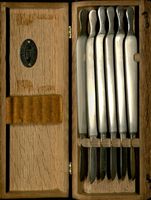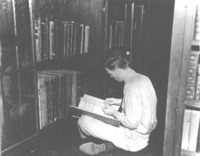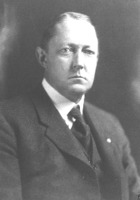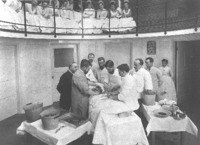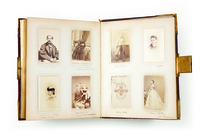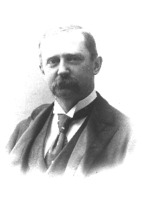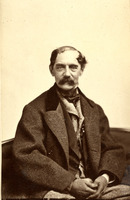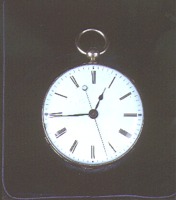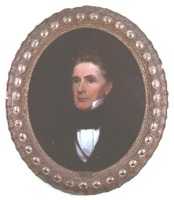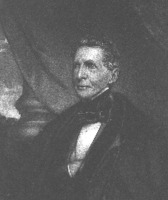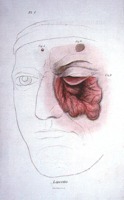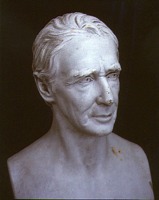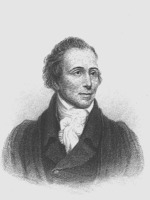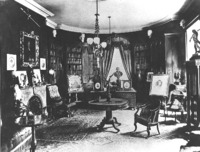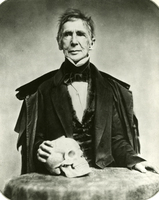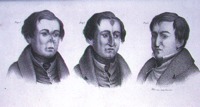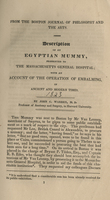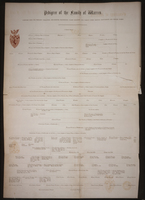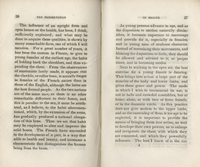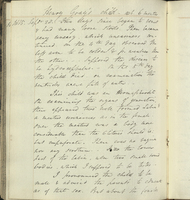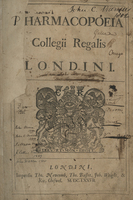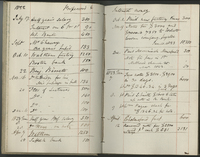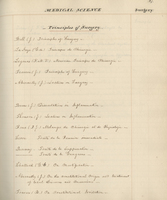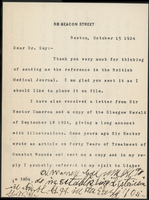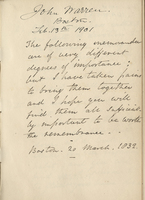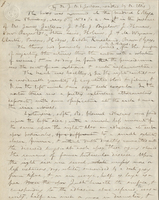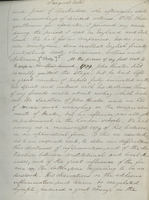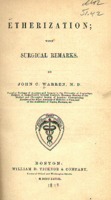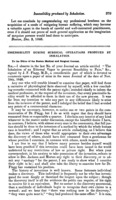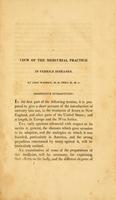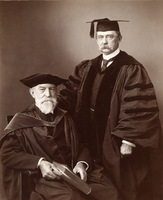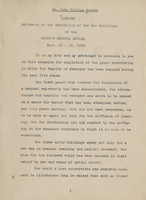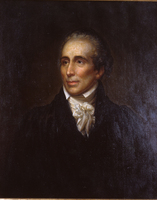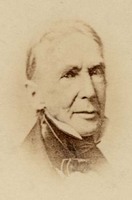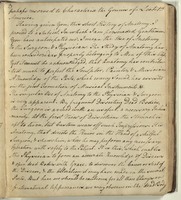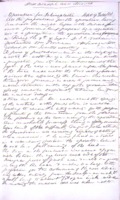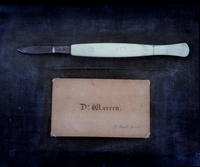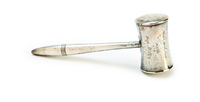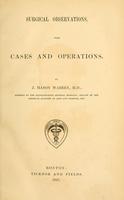Browse Items (39 total)
- Tags: Exhibit: A Family Practice
Sort by:
Set of Dissection Knives
Dr. J. Collins Warren developed this particular model of dissection knife for use with tumors of the breast and had them produced by Codman and Shurtleff, the famous Boston firm of instrument makers. Dr. Warren presented this set to his colleague,…
John Alexander Benson consulting volumes in the Warren Library
Five generations of physicians and educators in the Warren family assembled over 2,000 books, pamphlets, and manuscripts on medicine and surgical practice. At his death in 1928, Dr. John Warren bequeathed to the Harvard Medical Library this…
Dr. John Warren (1874-1928)
The great-great-grandson and namesake of John Warren, born September 6, 1874, continued the family practice of studying medicine at Harvard, taking his degree in 1900. He did not practice medicine and broke with the long tradition of surgery,…
Photograph Album of J. Collins Warren
Following in the tradition of his father and grandfather, John Collins Warren-usually known as "Coll"-studied medicine at Harvard and then completed his education in England, France, and Germany.
This album of carte-de-visite style photographs was…
Dr. J. Collins Warren (1842-1927)
Born on May 4, 1842, the fourth member of the Warren dynasty, John Collins-or "Coll"-Warren was also Harvard-educated, graduating from the College in 1863 and the Medical School in 1866. After completing his studies in Europe, he returned to Harvard…
Dr. J. Mason Warren (1811-1867)
The third generation of the Warrens associated with Harvard Medical School was represented by Jonathan Mason Warren. Born on February 5, 1811, the fourth child and third son of Dr. John Collins Warren, J. Mason Warren entered Harvard College in 1827,…
Pocket Watch
This Swiss gold repeating pocket watch was presented by Dr. Henry I. Bowditch to Dr. John Collins Warren "with gratitude and respect" upon his retirement from the faculty of Harvard Medical School on March 2, 1847. At Dr. Warren's death, the watch…
Portrait of Dr. John Collins Warren
One of the most renowned American surgeons of the 19th century, Dr. John Collins Warren (born on August 1, 1778) graduated from Harvard College in 1797, then began the study of medicine with his father, Dr. John Warren. In 1799, he went abroad,…
Dr. John Collins Warren (1778-1856)
One of the most renowned American surgeons of the 19th century, Dr. John Collins Warren (born on August 1, 1778) graduated from Harvard College in 1797, then began the study of medicine with his father, Dr. John Warren. In 1799, he went abroad,…
Surgical Operations on Tumours with Cases and Operations
Based on years of study and examination of patients and specimens, this compendium of Dr. John Collins Warren's research was intended to help physicians distinguish between different kinds of tumors and growths. Specimens from several of the cases…
Bust of Dr. John Collins Warren (1778-1856)
One of the most renowned American surgeons of the 19th century, Dr. John Collins Warren (born on August 1, 1778) graduated from Harvard College in 1797, then began the study of medicine with his father, Dr. John Warren. In 1799, he went abroad,…
Dr. John Warren (1753-1815)
Surgeon and educator John Warren was born on July 27, 1753, the son of a Roxbury farmer. He attended Harvard College, graduating in 1771. After studying medicine with his older brother, Joseph Warren (1741-1775), he removed to Salem to work alongside…
Dr. John Collins Warren (1778-1856)
One of the most renowned American surgeons of the 19th century, Dr. John Collins Warren (born on August 1, 1778) graduated from Harvard College in 1797, then began the study of medicine with his father, Dr. John Warren. In 1799, he went abroad,…
Rhinoplastic Operations with Some Remarks on the Autoplastic Methods
Dr. J. Mason Warren published his account of the first American rhinoplasty in the Boston Medical and Surgical Journal for March 8, 1837. The article is a landmark in the history of plastic surgery in this country. It was reprinted with two…
Description of an Egyptian Mummy
Renowned for his expertise in pathological analysis, Dr. John Collins Warren was approached by the Massachusetts General Hospital to report on the authenticity of an Egyptian mummy which had been donated to the hospital in 1823. The examination
Pedigree of the Family of Warren
Shortly before his death, Dr. John Collins Warren (1778-1856) researched and published Genealogy of Warren with Some Historical Sketches (Boston : John Wilson and Son, 1854), tracing his family from its earliest origins down through the birth of his…
Physical Education and the Preservation of Health
The second edition of Dr. Warren
Surgical Notes of John Collins Warren (1778-1856)
This record of the practice of Dr. John Collins Warren documents the treatment of some of his surgical patients and more unusual cases. The casebook records a number of operations for cataract, lithotomies, and cranial injuries, as well as…
Pharmacopoeia Collegii Regalis Londini
The Royal College of Physicians first began to publish an authoritative list of pharmaceutical compounds and directions for their use in 1618. The title-page of this third edition of the Pharmacopoeia is notable for the succession of signatures of…
Account Book of John Collins Warren (1778-1856)
These personal accounts from 1822 and 1823 show the salary which Dr. John Collins Warren earned for the professorship of anatomy and surgery at Harvard Medical School and the fee charged for training of individual pupils. The account book also…
Catalogue of the Library of Dr. John Collins Warren (1778-1856)
Dr. John Collins Warren began his own book collection while in Europe in 1799, and added to it many medical titles when he inherited his father
Letter from Dr. J. Collins Warren to Dr. George W. Gay
Dr. J. Collins Warren was one of the foremost proponents of Joseph Lister's antiseptic procedures during surgical operations. In this letter, written near the end of his life, he recalls his meeting with Lister in 1869 and his first personal…
Memoranda Book of J. Mason Warren (1811-1867)
Before J. Mason Warren departed to pursue his medical studies in Europe, Dr. John Collins Warren composed for him a volume of miscellaneous advice, suggesting lectures to attend and eminent physicians to meet, and charging him with certain…
Autopsy of Dr. John Collins Warren (1778-1856)
John Barnard Swett Jackson was Harvard Medical School's first professor of pathological anatomy and first curator of the Warren Anatomical Museum. He published catalogues of the specimens in the museum of the Boston Society for Medical Improvement…
Clinical Surgery
Shortly before his death, Dr. J. Mason Warren began to assemble the manuscript case reports and correspondence of his father, intending to publish this material as a record of Dr. John Collins Warren's years of experience in clinical surgery. That…
Etherization, with Surgical Remarks
Following the first public operation with ether anesthesia, Dr. John Collins Warren began to assemble data from over 200 surgical cases to promote the discovery, hoping to change "the slow progress of the practice of etherization in this country…
Insensibility during Surgical Operations Produced by Inhalation
On October 16, 1846, at Massachusetts General Hospital, Dr. John Collins Warren performed the first public operation on a patient under ether anesthesia administered by dentist William T. G. Morton. Dr. Henry Jacob Bigelow witnessed the event and…
A View of the Mercurial Practice in Febrile Diseases
Although Dr. John Warren published a number of pamphlets and articles—including the first article to appear in The New England Journal of Medicine and Surgery—this is his only monograph. It was published near the end of his life and…
Drs. Henry P. Bowditch and J. Collins Warren
Just as his great-grandfather had been instrumental in establishing the Harvard Medical School in the eighteenth century, so Dr. J. Collins Warren provided the impetus for the construction of the buildings of the Quad at the beginning of the…
The Enlarged Foundation
Just as his great-grandfather had been instrumental in establishing the Harvard Medical School in the eighteenth century, so Dr. J. Collins Warren provided the impetus for the construction of the buildings of the Quad at the beginning of the…
Dr. John Warren
In 1780, during the Revolutionary War, surgeon John Warren (1753-1815) began to deliver anatomical lectures to physicians at the military hospital in Boston. Warren went on to deliver public lectures during the winter of 1781-1782, at the invitation…
John Collins Warren
One of the most renowned American surgeons of the 19th century, Dr. John Collins Warren (born on August 1, 1778) graduated from Harvard College in 1797, then began the study of medicine with his father, Dr. John Warren. In 1799, he went abroad,…
Lectures upon Anatomy
Partially in the handwriting of Dr. John Warren, this volume of lecture notes, beginning on December 10, 1783, contains the earliest surviving record of teaching at Harvard Medical School. The lectures were delivered in Harvard Hall, on the campus in…
Scalpel and Probe
This Laundy scalpel and probe were the surgical instruments used by Dr. John Collins Warren at the first public operation under ether at the Massachusetts General Hospital on October 16, 1846. Dr. Warren presented the instruments along with his card…
"Surgical Observations with Cases and Operations"
An examination of the Lowell hip case by Dr. Jonathan Mason Warren, over 40 years after the trial took place. He looks at the disected hip bone - Charles Lowell died in 1858 - in an attempt to discover what really happened.

